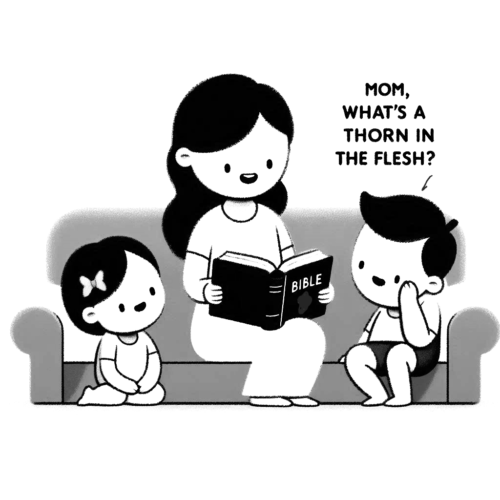What Was Paul’s Thorn in the Flesh? Four Leading Theories
Among passages in Paul’s letters that have generated much scholarly discussion and practical application is his mention of a mysterious “thorn in the flesh” in 2 Corinthians 12:7-10. In this deeply personal section of his letter, Paul reveals a profound struggle that shaped his ministry and understanding of God’s grace.
FIRST, THE BIBLICAL CONTEXT
In 2 Corinthians 12, Paul describes receiving “an abundance of revelations”—including a remarkable vision of being caught up to the third heaven. To prevent pride from these extraordinary experiences, he was given what he describes as “a thorn in the flesh, a messenger of Satan.” The Greek term used here, “skolops tē sarki,” literally means “a stake in the flesh,” suggesting something deeply painful and persistent.
Paul tells he pleaded with the Lord three times to remove the thorn. The response he received wasn’t healing, but rather divine reassurance: “My grace is sufficient for you, for my power is made perfect in weakness” (2 Corinthians 12:9).
SCHOLARLY INTERPRETATIONS THROUGH CHURCH HISTORY
The precise nature of Paul’s thorn has intrigued Christian thinkers throughout church history. Early Church Fathers, including John Chrysostom viewed it primarily as physical persecution, while Augustine suggested it may have represented physical ailments. Medieval interpreters even spiritualised the thorn—seeing it as internal temptations. During the Reformation, interpreters generally favoured more concrete explanations, particularly physical ailments or opposition from enemies of the gospel.
FOUR MAJOR CATEGORIES OF INTERPRETATIONS
- Physical Ailment Theory: Some scholars argue for a physical condition, with eye problems being the leading candidate. This interpretation finds support in Galatians 4:15, where Paul references the Galatians’ willingness to “tear out your own eyes and give them to me.” Others suggest conditions such as chronic fever, epilepsy, or severe migraines. The presence of Luke, “the beloved physician,” as Paul’s frequent companion is often seen as supporting a medical condition that required ongoing attention.
- Spiritual Warfare Interpretation: Paul’s description of the thorn as “a messenger of Satan” has led some interpreters to understand it as intense spiritual opposition. Throughout his letters, Paul shows awareness of spiritual warfare, particularly in Ephesians 6. This interpretation sees the thorn as direct demonic opposition meant to hinder Paul’s ministry—rather like Satan’s opposition to Job.
- External Opposition and Persecution: A third major view understands the thorn as referring to human opponents or persecution. Paul faced consistent opposition from Jewish religious leaders, Roman authorities, and even false teachers within the church. This interpretation connects well with the broader context of 2 Corinthians, where Paul frequently addresses opposition to his ministry.
- Internal Struggles: Some modern scholars suggest the thorn represented internal psychological or emotional struggles. This could include the weight of his pre-conversion activities persecuting the church, the constant pressure of church leadership, or recurring temptations. While this view is less common historically, it accounts for the deeply personal nature of Paul’s description.
GOD’S SUFFICIENT GRACE: APPLYING 2 CORINTHIANS 12:9
The heart of this passage—and indeed its enduring significance—lies in God’s response to Paul: “My grace is sufficient for you, for my power is made perfect in weakness.” The Greek term for “sufficient” (arkeō) carries the sense of being enough, of completely meeting a need. This isn’t a minimal provision but a full satisfaction of Paul’s need. God’s response wasn’t a mere consolation prize for Paul’s unanswered prayer; it was a greater gift. Rather than removing the thorn, God promised His sustaining presence through it.
- Grace Is Sufficient: The present tense of “is sufficient” suggests an ongoing, moment-by-moment sufficiency. God wasn’t merely telling Paul His grace would be enough to meet every need the thorn might bring. Like the daily provision of manna in the wilderness—grace would be given not in overwhelming abundance at once, but in perfect sufficiency for each day’s trials.
- Power Made Perfect in Weakness: Even more profound is the second clause: “for my power is made perfect in weakness.” The verb “is made perfect” (teleō) suggests bringing something to its intended goal or completion. Paradoxically, God’s power reaches its full expression not in eliminating our weaknesses, but in working through them. Our thorns become the very instruments through which God’s power is displayed.
- Paul’s Thorn and Our Thorns: This truth reshapes how we view our own “thorns in the flesh.” Whether they be physical ailments, persistent temptations, or external opposition, these weaknesses aren’t barriers to God’s work in our lives but rather channels for it. Just as the master craftsman displays his skill not by working with perfect materials but by creating beauty from flawed ones, God manifests His power most clearly through our weaknesses.
- When Answers to Prayer are ‘No’: The passage also teaches us that God’s “no” to our prayers for deliverance may actually be His “yes” to a deeper experience of His grace. When we pray for the removal of our thorns, we often assume that strength means the absence of weakness. But God’s response to Paul reveals that true strength is found in the presence of divine grace in the midst of continuing weakness.
In this light, our thorns serve not merely as instruments of humility (though they certainly are that) but as ongoing opportunities to experience the sustaining power of God’s grace. They become, in the economy of God’s providence, the very means by which we learn to depend more fully on divine strength rather than our own resources.
CONCLUSION
While we cannot definitively identify Paul’s thorn in the flesh, each major interpretation offers valuable insights into the nature of suffering, divine grace, and spiritual growth. Perhaps the very mystery of the thorn serves God’s purposes, allowing believers throughout history to identify with Paul’s experience of weakness and God’s sufficient grace.
What remains clear is the central message: God’s power is manifested not despite our weaknesses, but through them. Paul’s experience teaches us divine strength often works most evidently in human frailty, a paradox that lies at the heart of Christian experience.
PAUL’S THORN IN THE FLESH—RELATED FAQs
How do prosperity teachers misinterpret this passage, and what’s the crucial truth they overlook? Prosperity teaching often suggests Paul simply didn’t have enough faith, or that he should have continued praying until the thorn was removed. This interpretation fundamentally misunderstands both the purpose of suffering in the Christian life and the nature of God’s grace. Paul’s experience actually demonstrates God’s highest purpose isn’t our comfort or the removal of all suffering, but rather the display of His power through our weakness and our deeper experience of His grace.
How does Joni Eareckson Tada’s story parallel Paul’s experience with his thorn? After a diving accident left her quadriplegic at age 17, Joni earnestly prayed for healing, attending healing services and wrestling with God much like Paul did. Despite not receiving physical healing, she came to understand that her wheelchair became her platform for demonstrating God’s power and grace to millions worldwide through her ministry, books, and artwork. Like Paul, she discovered God’s grace was sufficient and His power was made perfect in her weakness.
Why does Paul describe his thorn as “a messenger of Satan” when it clearly served God’s purposes? Paul recognises both the immediate source and the ultimate purpose of his thorn—while Satan intended it for harm and hindrance, God sovereignly used it for good. The dual agency appears throughout Scripture, most notably in Joseph’s statement to his brothers: “You meant evil against me, but God meant it for good.” The thorn could simultaneously be a satanic attack and a divine instrument for sanctification.
Is there a pattern of God giving significant thorns to those He entrusts with significant ministry? Throughout Scripture and church history, we often see that those whom God uses powerfully also experience significant suffering or limitation. Moses had his speech impediment, Timothy his stomach ailments, Charles Spurgeon his depression, and Amy Carmichael her physical confinement. However, we should be careful not to universalise this pattern or suggest all significant ministry must be accompanied by significant thorns.
What should I do when my prayers for healing seem to go unanswered? First, continue bringing your burden to the Lord while also asking Him to help you see His purposes in your suffering. Second, look for ways your thorn might be developing Christ-like character in you or creating opportunities for ministry to others. Finally, remember God’s apparent “no” to physical healing might be His “yes” to a deeper experience of His grace and power in your life.
Can a thorn in the flesh ever be removed through prayer? Yes, God sometimes does remove thorns in response to prayer, and we should feel free to ask Him for healing or relief. However, the deeper lesson from Paul’s experience is that whether God removes the thorn or not, His grace is sufficient for us to bear it. Our focus should be less on the removal of the thorn and more on experiencing God’s sustaining grace through it.
How can I know if I should keep praying for removal or accept my thorn as Paul did? While Scripture doesn’t give us a precise formula, Paul’s example suggests that persistent prayer combined with attentiveness to God’s response is appropriate. When God makes it clear, as He did to Paul, that His purpose is to display His power through our weakness, we can shift our prayers from removal to requesting grace for endurance and wisdom to steward our thorn well for His glory.
PAUL’S THORN IN THE FLESH—OUR RELATED POSTS
Editor's Pick

Why Do People Hate the Doctrine of Election?
…WHEN THEY REALLY SHOULDN’T Few Bible doctrines provoke stronger reactions than election. The idea that God chose some for salvation [...]

The Doctrine of Providence: Does God Really Govern All Things?
You’re sitting in the doctor’s office when the diagnosis lands like a thunderclap. Your mind races: Why this? Why now? [...]

No Decay, No Defeat: What It Means That Christ’s Body Saw No Corruption
On the Day of Pentecost, Peter stood before thousands and made a startling claim: David's body decayed in the tomb, [...]
SUPPORT US:
Feel the Holy Spirit's gentle nudge to partner with us?
Donate Online:
Account Name: TRUTHS TO DIE FOR FOUNDATION
Account Number: 10243565459
Bank IFSC: IDFB0043391
Bank Name: IDFC FIRST BANK






